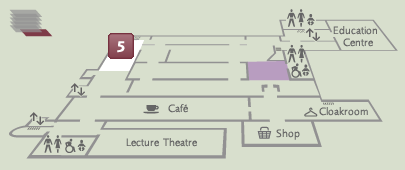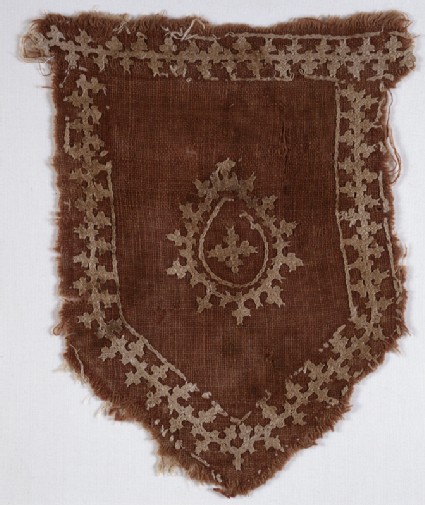Embroideries and Samplers from Islamic Egypt
A selection of 10th to 16th century embroideries from the Newberry collection at the Ashmolean by Marianne Ellis (published Oxford, 2001).

Publications online: 66 objects
- Reference URL
Actions
Tab with linked crosses and pear-shaped medallion
-
Literature notes
The embroidery stitch on this tab is claimed by the Armenians, who call it heusvadr gar. It is a complex stitch worked in two stages by lacing threads through a foundation of herringbone stitches to form small crosses which can be arranged singly, in lines and also in medallions. The link with a traditional style of Armenian embroidery raises the question of whether this fragment was imported, or made in Cairo by Armenians who had settled in this great cosmopolitan centre of the Arab world. The designs do not provide a conclusive answer but it is interesting that one in this category is embroidered with a fleur-de-lys (another Mamluk blazon). -
Details
- Associated place
-
Near East (place of creation)
- Date
-
late 13th century - early 14th century
Mamluk Period (1250 - 1517)
- Material and technique
- cotton, dyed red, and embroidered with white flax; linen lining, partly embroidered with white flax; with stitching in flax
- Dimensions
-
19 x 15 cm (length x width)
ground fabric (cotton), along length/width 14 / 16 threads/cm (thread count)
ground fabric (linen), along length/width 26 / 26 threads/cm (thread count)
ground fabric (cotton) 0.1 cm max. (thread diameter)
ground fabric (cotton) 0.02 cm min. (thread diameter)
ground fabric (linen) 0.04 cm (thread diameter)
- Material index
- Technique index
-
assembled › woven › plain woven,woven › plain woven,dyed,
- Object type index
- No. of items
- 1
- Credit line
- Presented by Professor Percy Newberry, 1941.
- Accession no.
- EA1993.240
-
Further reading
Ellis, Marianne, Embroideries and Samplers from Islamic Egypt (Oxford: Ashmolean Museum, in association with Greenville: Curious Works Press, 2001), no. 53 on p. 78, p. 10, illus. p. 79
Barnes, Ruth and Marianne Ellis, ‘The Newberry Collection of Islamic Embroideries’, 4 vols, 2001, Oxford, Ashmolean Museum, cat. p. 201 (vol. iv), illus. vol. iv p. 201
Location
-
-
Lower ground floor | Room 5 | Textiles

-
Lower ground floor | Room 5 | Textiles
Objects are sometimes moved to a different location. Our object location data is usually updated on a monthly basis. Contact the Jameel Study Centre if you are planning to visit the museum to see a particular object on display, or would like to arrange an appointment to see an object in our reserve collections.
Publications online
-

Embroideries and Samplers from Islamic Egypt
The embroidery stitch on this tab is claimed by the Armenians, who call it heusvadr gar. It is a complex stitch worked in two stages by lacing threads through a foundation of herringbone stitches to form small crosses which can be arranged singly, in lines and also in medallions. The link with a traditional style of Armenian embroidery raises the question of whether this fragment was imported, or made in Cairo by Armenians who had settled in this great cosmopolitan centre of the Arab world. The designs do not provide a conclusive answer but it is interesting that one in this category is embroidered with a fleur-de-lys (another Mamluk blazon). -

The Newberry Collection of Islamic Embroideries
A tab with a border of linked cross-shapes and a pear-shaped medallion in the centre. The medallion contains a cross.
The tab is of red cotton with a linen backing. The interlaced embroidery is only stitched on the red cotton, while the chain stitch which frames the tab border goes through to the linen backing.
Notice
Object information may not accurately reflect the actual contents of the original publication, since our online objects contain current information held in our collections database. Click on 'buy this publication' to purchase printed versions of our online publications, where available, or contact the Jameel Study Centre to arrange access to books on our collections that are now out of print.
© 2013 University of Oxford - Ashmolean Museum

